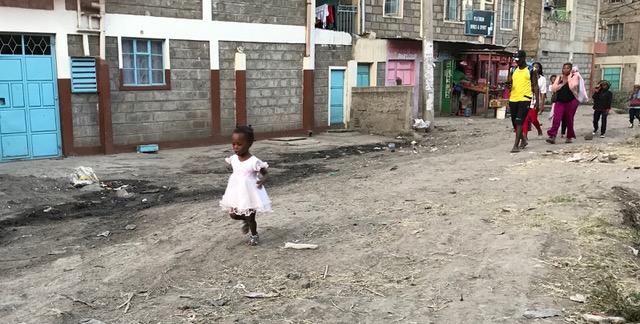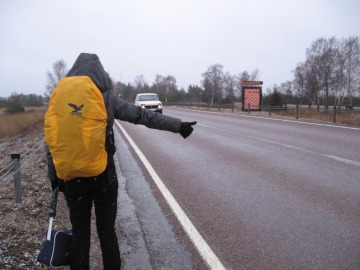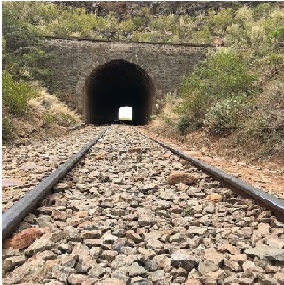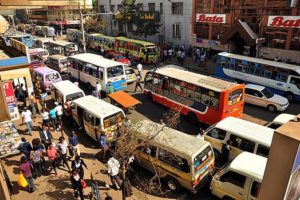By Matthew Temple
Last week, while hiking in the mountains on the east side Kenya’s Great Rift Valley, I got lost walking back to Cera’s mom’s house. Long after dark, I came to a group of six men, loading a truck with corn to take to market. As I was lost, I asked them to show me the way to where I was going. They were just finishing up and offered to take me the 1 kilometer to the fork in the road and put me back on the right path. I hopped in with them and took the ride.
For much of my life, I was rather unaware of my manness. The things I did, where I did them, and at what time of day or night I did them, was never an issue. In my world view, my experience as a man was universal.

Little Girl feeling free. Nairobi, Kenya
As a kid at school, I learned history from the perspective of men who looked like I would look when I grew up. We read books, recited poetry and spoke of “human” as “man”, which my teachers justified by saying that both girls and boys see themselves in the hero, regardless of gender (all research shows the opposite to be true). So, when girls around me expressed fear at jogging alone after dark, for example, I dismissed their concerns. If my experience as a man was universal, then they should listen to me: life is not that dangerous. Yes, there’s danger, but it’s only as great as how much you buy into it.

At the age of 16, I became a hitchhiker. And over the next four years, I clocked tens of thousands of hitchhiking miles from Germany to Ireland, Hungry, through Austria and Italy to Greece and back; through Mexico, around California and a tour through the American north east.
When the adults around me expressed shock, I stood proud. I truly loved to hitchhike. I met great people who I otherwise never would have known, I traveled to places I otherwise wouldn’t have been able to afford to travel and, while I didn’t recognize it then, I had time to just think. To just stand and do nothing, sometimes for hours on end. Wherever I landed, I could crash on a couch or throw my sleeping bag out and get up the next day for another adventure.
I learned what has remained a truth in my life since – the world gives back to me what I give to it. That people are as trustworthy and kind as I am able to see the good in them. But what I have learned since, is that to have that outlook on life, the freedom to believe in, and see the good in, others in that trusting way, is a privilege. And not everyone has it.
If you’ve been reading my work at all, you know I like to be wrong. Well, I like discovering in what way I am wrong so I can learn and grow. I know that as a mere mortal, my vantage point in the grand scheme of things is so low, I can’t see over the proverbial mole hill. But being wrong about this stings. I was certain that the world is a good place and most people are generally trustworthy, and that’s who you will attract if that’s what you put out to the world. I was certain that if the women I knew could just trust, if they could just heed the wise words of Henry L. Stimson that “The only way to make a man trustworthy is to trust him,” they would have no problems. I still think there’s truth in that – but that’s one small piece of a very large tapestry that is life.
I knew a few women who hitchhiked, who would throw a sleeping bag wherever at night. I could ignore the realities of millions of women worldwide who were harassed daily, or raped and intimidated because I knew instances in which that was not true. Women who “proved” over and over again that the world isn’t as dangerous as other women perceived it to be. I believed that a few outlier examples were data.
Old rail tunnel. Great Rift Valley, Kenya

My own experience isn’t data. It’s not the Truth, it won’t hold for everyone (or even most people) and not most of the time. And even more certainly, not for both genders equally.
A few weeks ago, Cera and I got off a bus in Nairobi when some guy just grabbed her arm. She pulled away and sped up. I had seen this happen fairly frequently and, as angry as it makes me, it was becoming par for the course in certain parts of town. But this guy didn’t stop. He came in harder and with more force and grabbed her again. I was a few feet behind her – and I pounced. I unleashed the pent up anger at seeing what women deal with all the time, and the knowledge that it only takes one asshole, one time, to keep a woman on guard and unable to trust and relax.
Other people saw what he did, and then saw the way I reacted and within seconds there was a group of men around us, ready to beat him to a pulp. The women who saw it egged us all on. In that moment, I had to change the narrative. I had to explain to the other men there, ready for blood, that we can’t fight ugliness with violence.
I turned to this young man and looked him in the eyes and said, “Never, ever touch a woman without her permission. Treat every woman with the respect you would show your mother or grandmother.”

I can cross the same street without that kind of thing EVER happening to me. And that is a very big difference that reverberates out into every other choice I get to make in my life. When I didn’t listen to women’s stories, I would have seen this in relationship to MY experience – uncomfortable, but not threatening. I was understanding the events assuming the universality of my experience.
I wish I could say this problem is isolated, but then how could I explain something similar happening on our jog TOGETHER in our safe neighborhood in Northridge, California. Or my seventeen year-old daughter being propositioned by a pimp on her way home from school just blocks from our home.
I know now. I know that ignorance is never bliss because, if I want a world of equality, I can’t ignore the experience of others. I am an adventurer and a risk-taker. I’m going to continue to go places and do things others would find too dangerous. Someday, I’d like all of my women friends, my daughters and my partner to be able to do what I do if they want to, without thinking twice. But unless we all wake up to the problem, we can’t solve it. We have to be aware. And for me, I need to be aware of my own privilege and the huge gifts that I have: as a man, I don’t think twice when I walk home after dark.